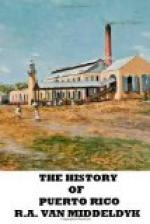From 1820 to 1823, under the auspices of a constitutional government, intellectual life in Puerto Rico really began. A Mr. Louis Santiago called public attention to the necessity of attending to primary education. “The greatest evil,” he said, “that which demands the speediest remedy, is the general ignorance of the art of reading and writing. It is painful to see the signatures of the alcaldes to public documents.” He wrote a pamphlet of instructions in the art of teaching in primary schools, which was printed and distributed through the interior of the island. The governor, Gonzalo Arostegui, addressed an official note to the Provincial Deputation charging that body to propose to him “without rest or interruption, and as soon as possible,” the means to establish primary schools in the capital and in the towns of the interior; to the municipalities he sent a circular, dated September 28, 1821, recommending them to facilitate the coming to the capital of the teachers in their respective districts who wished to attend, for a period of two months, a class in the Lancasterian method of primary teaching, to be held in the Normal School by Ramon Carpegna, the political secretary. A certain amount of instruction, talent, and disposition for magisterial work was required of the pupils, and those who already had positions as teachers could assist at the two months’ course without detriment to their salaries.
The fall of the constitutional government in Spain, brought about by French intervention and the reaction that followed, extinguished the light that had just begun to shine, and this unfortunate island was again plunged into the intellectual darkness of the middle ages. Persecution became fiercer than ever, and the citizens most distinguished for their learning and liberal ideas had to seek safety in emigration.
For the next twenty years the education of the youth of Puerto Rico was entirely in the hands of the clergy. With the legacies left to the Church by Bishop Arizmendi and other pious defuncts, Bishop Pedro Gutierrez de Cos founded the Conciliar Seminary in 1831, and appointed as Rector Friar Angel de la Concepcion Vazquez, a Puerto Rican by birth, educated in the Franciscan Convent of Caracas.
In the same year there came to Puerto Rico, as prebendary of the cathedral, an ex-professor of experimental physics in the University of Galicia, whose name was Rufo Fernandez. He founded a cabinet of physics and a chemical laboratory, and invited the youth of the capital to attend the lectures on these two sciences which he gave gratis.




